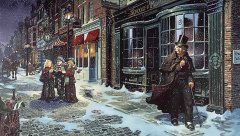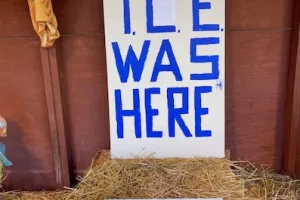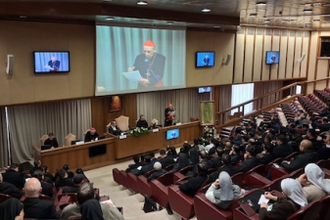Christmas meditation with Father Terry Tastard

Scrooge passes carol singers
Of all the literature about Christmas, perhaps the best-loved is Charles Dickens's A Christmas Carol. The story moves forward through the encounter of Scrooge with three ghosts: The Ghost of Christmas Past, the Ghost of Christmas Present, and the Ghost of Christmas Yet To Come. As he journeys through time, Scrooge's legendary meanness is challenged, and he undergoes a profound change of heart.
The entire story takes place within less than 24 hours, from Christmas Eve to the morning of Christmas Day. Despite the Christmas setting, religion is hardly present. You could interpret the whole thing as a secular parable about our need to be generous and compassionate. Many in Britain today would say as much. Who needs religion for human improvement? Bah, humbug!
And yet, look again at the story. In the first chapter, this is how Dickens describes Scrooge:
'Oh! But he was a tight-fisted hand at the grind-stone, Scrooge! A squeezing, wrenching, grasping, scraping, clutching, covetous, old sinner!'
Scrooge's love of money has made him not only hard-hearted, but a sinner. This is religious language. And that is not all. The key to Scrooge's change is the glimpse of his own mortality. Here, too, there is a hint of religion as Scrooge suddenly gets perspective on the worthlessness of his life. He sees that if he continues to be the person he is, no one will mourn him, no one will miss him when he is gone. To seal the message he glimpses his own gravestone. Then, in a wonderful moment of Dickensian humour, Scrooge stretches out his hand to plead with his grim guide. He clutches the hand of the ghost and begs for a second chance, only to wake up and find that he is clutching … the bedpost. It has all been a terrible dream.
Or has it? Because it turns out to be a life-changing experience for Scrooge. And notice what the change is. He recovers the ability to feel, and this is shown above all in his treatment of the family of a handicapped child, Tiny Tim. Scrooge shudders at the thought of their suffering because of the child's premature death.
Where he was mean, he now becomes generous. Where he was closed, he now becomes open. Where he was dead, he is now alive. He sends them the biggest turkey. He goes to church. He invites himself to his nephew's house for Christmas dinner. Not only is Scrooge changed in his attitude to others, he is changed in his attitude to himself. He is born again.
A second chance. Coming alive. Openness. Feeling the sufferings, hopes, joys of others. No wonder Dickens set the story at the heart of Christmas, because without Christmas the story would have made no sense. At Christmas we remember God coming
to the world to give it another chance, to bring it new life. And God does it in a way that tugs our hearts: the glimpse of the holy child in the manger. Through this mystery, Christ present as a vulnerable infant, God invites us to recover our feelings. Deep down we know this. This is why families gather. This is why charities make appeals at this time of year. This is why hospitality is at the forefront of our thoughts. For a moment, we see the world as it could be: a place where everyone matters, a world where no one suffers alone, a world we feel for each other, and in doing so, learn to care for each other.
Of course, we know how the story of Christ will unforld. The child will grow up and become the great teacher. His death will distress us, and his resurrection is the turning-point of the world. Because we see the whole of his life, we will learn to bring the whole of our life and see it differently. For now, though, it is enough to stand with the shepherds and watch with awe. God does this for us. God loves us enough to come to us in this way. God does not come to us as a plan for self-improvement. God comes to us as a vision of love. Yes, he challenges us to live differently, but as he challenges he inspires at the same time.
God cares for us enough to come among us as one of us, as that oh-so-vulnerable child, and reaches out to us. If you feel that you want to protect and love that infant, then already Christ has opened your heart, and you will find to your astonishment that God loves you. We know, deep in our hearts, that the tender love, of this human scene is a wonderful image of God's tender love for us. This is a love that inspires us: a love that we are now challenged to show to one another.
This is why Christmas became so great a feast: it shows us the possibilities of another, very different world. In this new world we are at peace because we are at home with God who has made his home with us.
Fr Terry Tastard is parish priest (pastor) of Holy Trinity, Brook Green, in the Hammersmith area of London. His new book: Ronald Knox and English Catholicism is published by Gracewing at £12.99 and is available on Amazon, from religious booksellers and from the publisher.
















